DUBAI // One of the largest universities in the United States has welcomed its first intake of students to its new campus in Dubai, joining a growing host of foreign universities with satellite branches in the Emirates. For Professor Brendan Mullan, the executive director of Michigan State University Dubai, the creation of the campus - in Dubai International Academic City - has been "a whirlwind experience, to say the least".
Such have been the difficulties in setting up that Prof Mullan, an American originally from Northern Ireland, has dubbed this as "year zero". "No international university that has opened in Dubai has been immune from the challenges of year zero and that's what we're finding now," he said. One of those challenges has been attracting students, as other institutions have also realised. When classes began at George Mason University, the first US university to open a branch in the UAE, in Ras al Khaimah in 2006, the student body was just one-fifth of the predicted number.
For MSU Dubai, as is the case for other start-ups, recruitment has been complicated by not having a campus for prospective students to visit. Also, as the university had not marketed itself until February, the recruitment run-up to the new academic year was shorter than normal. Despite these difficulties, Prof Mullan said MSU Dubai had "phenomenal" early interest. With a first-year student enrolment of more than 50 and other students set to join later this academic year, he said recruitment, contrary to previous reports, had not been below expectations.
The aim is for annual enrolment to grow to at least 160 and within four years, the university could have between 750 and 1,000 students. "In the last two weeks, since the faculty arrived and the campus has opened, there's been a significant spike in applications," Prof Mullan said. The university could draw in students keen to secure a US degree without having to live in America. Prof Kim Wilcox, the provost and vice-president of MSU, said in the current climate, many students and parents were not keen on the idea of studying in the US.
"Post 9/11 and other things in the world, there is increased sensitiveness on the part of a lot of people," he said. The Dubai campus was not set up to draw in as many students as possible to generate revenue for its parent university in East Lansing, Prof Wilcox said. Martin Prince, the registrar of the British University in Dubai, recently talked of a higher education "gold rush", in which institutions were opening campuses that taught undergraduates but were not engaged in research.
Prof Wilcox said there were "lots of gold rushes" in higher education, but insisted MSU's Dubai campus was not part of one. "I don't know what the finances are going to work out to, but the financial side is only a small part. The bigger return is the visibility. We want to be associated with a winner and Dubai is a winner," he said. "Most things in universities are not done for profit and that's how we think about Dubai. If we wanted to turn a profit, we could do it more cheaply and easily at home. We didn't come halfway around the world to turn a profit. We did it for more fundamental reasons.
"We're reaching out to the Government, to the private sector. Our intention is to do all of the things a university should do as part of the community. The fact that we're doing it in the most expensive way is arguably the strongest indication that we're serious about this." Prof Wilcox said the university would become involved in activities such as public lectures and consultancy and advisory work for the public and private sectors. This mirrors the promises of other branch campuses, such as New York University, which has already carried out public events in advance of the planned opening of its branch on Saadiyat Island in Abu Dhabi.
"We want a full presence here. That's because the community needs it, but also because that's how good universities operate." This "full presence" includes offering master's degrees in subjects such as retailing and human resources and labour relations. This is in addition to bachelor's courses in, for example, computer engineering, construction management and early childhood education. "It was very important to us to offer postgraduate programmes in addition to the undergraduate," said Prof Mullan.
Ultimately, the university could offer doctoral programmes of the kind that have rarely been offered to students in the UAE. However, Prof Wilcox said: "It would be hard to capture all the expertise a doctoral student needs access to in Dubai for a while." The school might also seek accreditation from the Ministry of Higher Education and Scientific Research's Commission on Academic Accreditation (CAA), although the university is already accredited in the US.
dbardsley@thenational.ae







